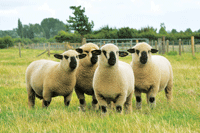Breeding for worm resistance in sheep

Incorporation of faecal egg counts (FEC) into the Estimated Breeding Value (EBV) scoring system could help sheep producers breed for worm resistance in the future.
Speaking at the SCOPS (Sustainable Control of Parasites) Principles in Action event at Waterend Farm, Gloucestershire, independent consultant Lesley Stubbings said future resistance to worms was reliant on “bringing in different genetics”.
She recommended the use of worm-resilient rams for ewes producing lambs for slaughter, and worm-resistant rams for breeding ewes.
“A sheep that is genetically resistant to worms means a sheep that can allow worms in, but stop them from establishing in the gut, resulting in less paddock contamination. Breeding this kind of resistance into the animals that are going to be slaughtered is not going to get us far, but we can breed it into our breeding ewes.
“It isn’t a short or medium-term fix, and it probably takes about 14 years before you see any real tangible benefit, but it’s certainly worth doing.”
She said breeding for resilience – a worm-resilient sheep continues to perform, despite the presence of worms – was also possible and would be beneficial for ewes producing lambs for slaughter.
“It’s not about saving money, it’s about getting really good performance from the lambs and ensuring the long-term sustainability of being able to control worms on the farm,” added Ms Stubbings.
